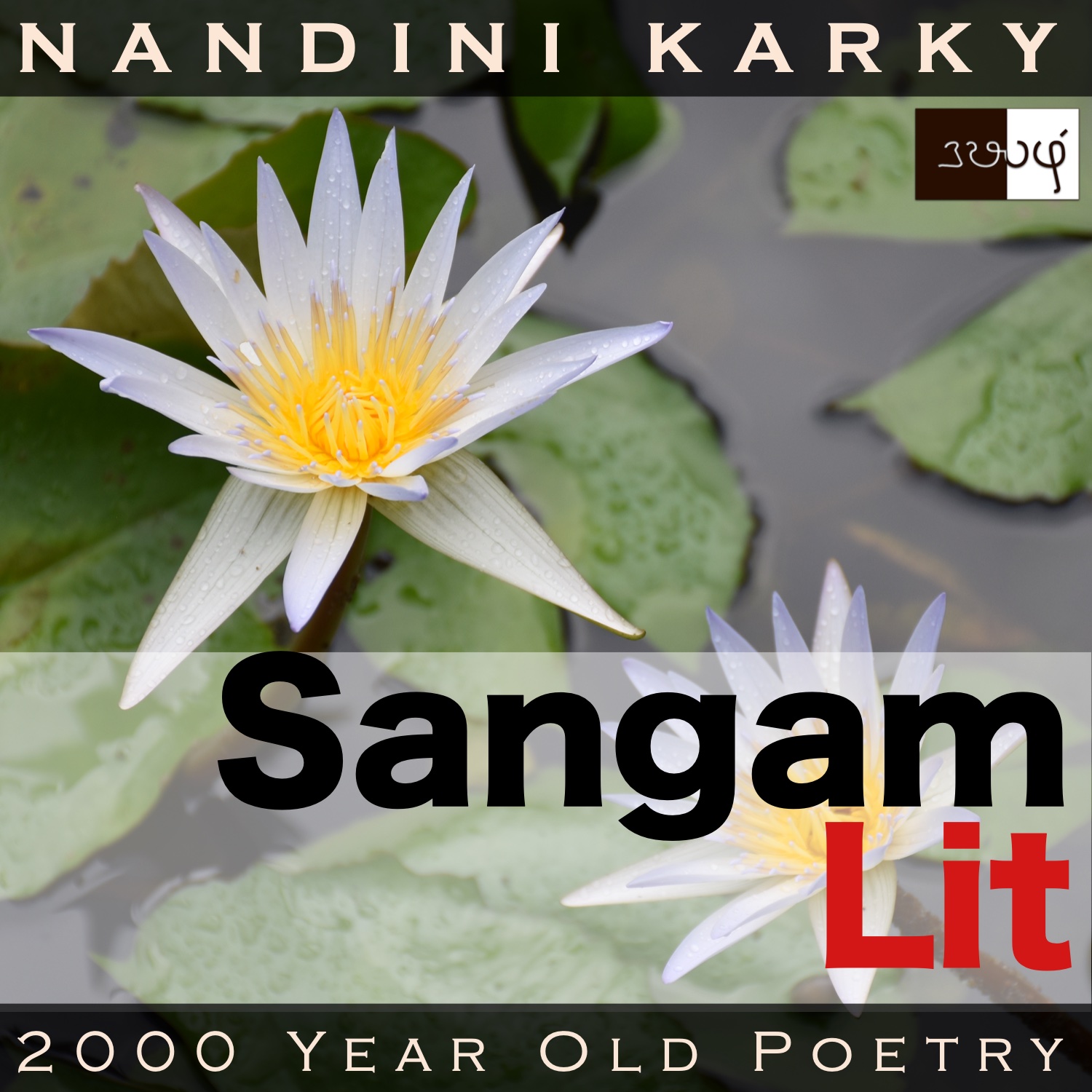Podcast: Play in new window | Download
Subscribe: Apple Podcasts | Spotify | Amazon Music | Android | iHeartRadio | Email | TuneIn | RSS | More

In this episode, we listen to defensive words to clarify a situation, as depicted in Sangam Literary work, Kurunthogai 370, penned by Villaka Viralinaar. Set in the farmlands of ‘Marutham’, the verse speaks in the voice of the courtesan, in response to disparaging words spoken by the lady, as the lady’s friends listen nearby.
பொய்கை ஆம்பல் அணி நிறக் கொழு முகை
வண்டு வாய் திறக்கும் தண் துறை ஊரனொடு
இருப்பின், இரு மருங்கினமே; கிடப்பின்,
வில்லக விரலின் பொருந்தி; அவன்
நல் அகம் சேரின், ஒரு மருங்கினமே.
‘Everything unfolds as he wants’ is the core thought here. The opening words ‘பொய்கை ஆம்பல்’ meaning ‘a white waterlily in the pond’ soothes our eyes with the dazzling hue of this flower. In the phrase ‘வண்டு வாய் திறக்கும்’ meaning ‘the bee opens its petals’, we see a belief system in place, about which we will explore shortly. ‘வில்லக விரலின் பொருந்தி’ meaning ‘fitting together like a finger on a bow’ brings to fore, the striking image of steady fingers holding a bow and has rendered the name of this song’s poet. Ending with the words ‘ஒரு மருங்கினமே’ meaning ‘one body’, the verse welcomes us to know more.
Buds are blooming, and bows are being bent here! The context reveals that the man and lady were leading a married life when the man took to keeping the company of a courtesan. This action angers the lady and she speaks disparaging words about how the courtesan has cunningly kept the man to herself. These words soon reach the ears of the said courtesan. One day, when the lady’s friends are listening nearby, the courtesan says. “The beautiful-hued fleshy bud of the white lily in the pond is opened by a bee in the moist river shores of the man. If he stays with me, we are two bodies; And, if he lies with me, we fit together like fingers on a bow; When he parts away to his good home, I am left behind as one body!” With these words, the courtesan defends her honour and points out how there was no cause for the lady to blame the courtesan for this situation.
What could be the deeper meaning of this response? Let’s understand by listening to her words closely. The courtesan highlights a white waterlily in a pond and the way its new buds are being opened by bees in the town of the lord. After that description of the man’s place, she mentions how when the man was with her, they were two bodies, joined as one life, akin to fingers on a taut bow, and concludes by saying, when he leaves her to go to his home, she is left behind as one body.
The courtesan means that it’s the man who decides whether to come to her or not and it’s not because of the devious actions of the courtesan. This thought she also encases in the image of the bee opening the mouth of a flower by echoing a metaphor of the man seeking her out because of her glowing beauty, akin to that of the white waterlily, and not because of anything the courtesan does. So, don’t you go blaming me, it’s all because of your man, the courtesan conveys firmly to the listening lady’s friends.
To me, the highlight here is the belief of Sangam people that flowers did not bloom on their own but they were opened by the bees that seek nectar. Indeed, a different way of attributing a spontaneous event to the action of this animal! Another aspect is how anger dims the seeing. This is why the lady blame the courtesan instead of her man, and the courtesan points out in a picturesque way, the truth about where the blame lies. A way of life so strange to us, but still holding within, relatable lessons for today’s world!




Share your thoughts...